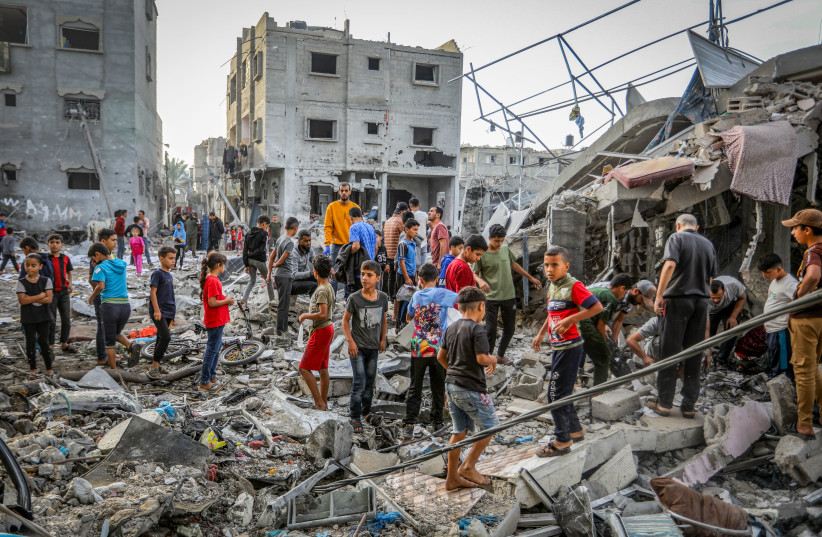Who do Arab Israelis think should govern in the Gaza Strip?
Some 8.4% of Israeli Arabs feel that Israel should govern in the Gaza Strip after the Israel-Hamas war, while some 14.7% feel that Hamas should govern, a study by the Moshe Dayan Center at Tel Aviv University presented Wednesday found.
Respondents were asked about their opinions on what the day after the war should look like. When asked, “Who should assume responsibility for governing life in the Gaza Strip after the war?” some 58.5% felt that the Gaza Strip should be governed by Palestinians.
Breaking down the preferences of these respondents: some 24.4% felt that the strip should be governed by local bodies from Gaza. Some 19.4% (the second highest proportion) felt that the Palestinian Authority should govern the Gaza Strip. With the 14.7% who believe that Hamas should govern, representing the smallest proportion of this group.
Some 34.4% of respondents felt that an external, non-Palestinian body should govern life in the Gaza Strip after the war. The preferred option for such a body, with 19.4% of respondents supporting this, is an international force. The second more preferred option for these respondents is the 8.4% who believe that Israel should govern; and some 6.5% believe that Arab states should govern.
What do Arab Israelis feel amid the ongoing war with Hamas?
Some 74% of those surveyed reported a low sense of personal safety during the war, with 41.2% saying that safety is “very low.” This is down from November 2023 when a poll with identical methodology found that 81.1% reported that their personal safety declined due to the war.

After eight months of war, this is a relatively minor decline “and most Israeli Arabs continue to feel unsafe,” said the study.
Over half of the Arab public in Israel, some 51.6%, feel that a sense of shared destiny has been created by the Israel-Hamas war, the study also found.
This majority is true for Arab Israelis of all religious backgrounds with 51.4% of Muslims, 62.5% of Druze, and 61.2% of Christians believing this, according to the study.
Some 25.3% think that the fact that the war has engendered such a feeling is true “to a great extent,” and while 48.4% think that the war has not engendered such a feeling. Some 33.6% totally deny that such a feeling exists.
Violence and crime remained the most important issue for Israeli Arabs today, the survey found. As in previous surveys, this issue was still “at the top of the Arab Israeli sector’s agenda” with 60.6% saying this. The Palestinian problem was a far second, with 11.3% naming this as the most important issue, regularization of construction in Arab towns came in third with 10.1%.
The poll found that a large majority (68.6%) support an Arab political party joining a coalition established after the next election with 40.2% in favor of an Arab party “joining any coalition, not only a center-left government.”
“The study shows that the current war between Israel and Hamas, which is the longest and hardest in the history of the Israeli-Palestinian conflict since 1948, has not altered the political compass of Israel’s Arab citizens,” said Dr. Arik Rudnitzky, director of the Konrad Adenauer Program.
“The findings provide clear proof for the distinction they make between fluctuations in the broader context of the Israeli-Palestinian conflict and political developments inside Israel, which they are able to influence,”
“Israel’s Arab citizens worry about their brethren in Gaza, which is only natural and should be respected. However, it’s important to understand that sympathizing with Palestinians in Gaza is not the same as identifying with their political leadership,” he added.
Some 502 Arab Israelis over age 18, who constitute “a representative sample of Israel’s Arab Adult population,” were surveyed for the study.





Comments are closed.